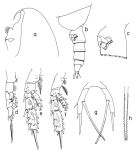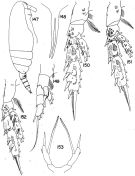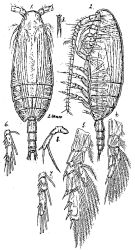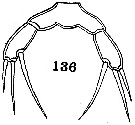|
|
 |
Fiche d'espèce de Copépode |
|
|
Calanoida ( Ordre ) |
|
|
|
Clausocalanoidea ( Superfamille ) |
|
|
|
Scolecitrichidae ( Famille ) |
|
|
|
Scaphocalanus ( Genre ) |
|
|
| |
Scaphocalanus medius (Sars, 1907) (F,M) | |
| | | | | | | Syn.: | Amallophora media Sars, 1907 a (p.16);
? Scolecithrix gracilipes Farran, 1908 b (p.52, figs.F, Rem.);
Scaphocalanus major : Park, 1970 (p.476, 503, figs.F); ? Roe, 1972 (p.309); | | | | Ref.: | | | Sars, 1925 (p.173, figs.F); Rose, 1933 a (p.149, figs.F); Sewell, 1929 (p.208, Rem.); ? Wilson, 1942 a (p.207, fig.F); Lysholm & al., 1945 (p.28); C.B. Wilson, 1950 (p.328, figs.F,M, Rem.); ? Brodsky, 1950 (1967) (p.251, Descr.M, figs.F,M, Rem.)Vaupel-Klein, 1970 (p.4, 19); Bradford, 1973 (p.143), Björnberg & al., 1981 (p.639, figs.F); Park, 1982 (p.77, 110, figs.F, Rem.); Bradford & al., 1983 (p.93, 101); Vives & Shmeleva, 2007 (p.763, figs.F,M, Rem.) |  issued from T. Park in Biology of the Antarctic Seas XI, Antarct. Res. Ser, 1982, 34. [p.111, Fig.21]. Female: a, forehead (lateral); b, last thoracic segment and urosome (lateral left side); c, genital segment (lateral); d, P1 (anterior); e, P2 (posterior); f, P3 (posterior); g, P5 (posterior); h, distal part of inner spine of P5. Nota: Urosome about 29/100 length of prosome. All cephalosomal pappendages seem similar to those of S. major. The species differs from S. major by anterior surface spinulation of P1.
|
 Issued from : T. S. Park in Bull. Mar. Sc., 1970, 20 (2). [p.506, Figs.147-153]. As Scaphocalanus major. Female (from Caribbean Sea & G. of Mexico): 147, habitus (lateral right side); 148, rostrum (anterior view); 149, P1 (anterior); 150, P2 (posterior); 151, P3 (posterior); 152, P4 (posterior); 153, P5. Nota: prosome a little more than 3 times length of urosome. P5 2-segmented, the external spine small and often absent.
|
 Issued from : G.O. Sars in Résult. Camp. Scient. Prince Albert I, 69, pls.1-127 (1924). [Pl.XLIX, figs.1-8]. Female: 1, habitus (dorsal); 2, idem (lateral left side); 3, rostrum; 4, P1; 5, P2; 6, endopodal segments of P3; 7, endopodal segments of P4; 8, P5.
|
 Issued from : K.A. Brodskii in Calanoida of the Far Eastern Seas and Polar Basin of the USSR. Opred. Fauna SSSR, 1950, 35 (Israel Program for Scientific Translations, Jerusalem, 1967) [p.251, Fig.158]. With doubt. Female (from NW Pacif.): habitus (dorsal and lateral right side); S5, P5. Male: habitus (dorsal; S5, P5. Nota: Pacific specimens are larger than the Atlantic ones; they also differ in the length ratio of the inner bristle of P5 in female.
|
 issued from : C.B. Wilson in Scientific Results of Cruise VII of the Carnegie during 1928-1929. Biology-I. Carnegie Inst. Wash. Publ. 536, 1942. [p.233, Fig.136]. With doubt. Female (from SE Pacific): 136, P5. Nota: Head without crest. The structure of P5 is quite different from that in the other authors.
| | | | | Ref. compl.: | | | Sewell, 1948 (p.349, 502, 521, 546, 566); Fagetti, 1962 (p.24); Grice, 1963 a (p.495); Unterüberbacher, 1964 (p.24); De Decker & Mombeck, 1964 (p.14); Grice & Hulsemann, 1965 (p.224); Fleminger, 1967 a (tabl.1); Carter, 1977 (1978) (p.35); Deevey & Brooks, 1977 (p.256, Table 2, station "S"); Vives, 1982 (p.292); Lozano Soldevilla & al., 1988 (p.59); Lapernat, 2000 (tabl.3, 4); Razouls & al., 2000 (p.343, Appendix); Yamaguchi & al., 2002 (p.1007, tab.1); Sameoto & al., 2002 (p.13); Somoue & al., 2005 (Table I: p.68); Ikeda & al., 2006 (p.1791,Table 2); Gaard & al., 2008 (p.59, Table 1, N Mid-Atlantic Ridge); Park & Ferrari, 2009 (p.143, Table 5, Appendix 1, biogeography); C.E. Morales & al., 2010 (p.158, Table 1); Homma & Yamaguchi, 2010 (p.965, Table 2); Homma & al., 2011 (p.29, Table 2, 3, abundance, feeding pattern: detritivores); Lidvanov & al., 2013 (p.290, Table 2, % composition); El Arraj & al., 2017 (p.272, table 2); | | | | NZ: | 14 | | |
|
Carte de distribution de Scaphocalanus medius par zones géographiques
|
| | | | | | | | |  Carte de 1996 Carte de 1996 | |
| | | | Loc: | | | sub-Antarct. (Indien, SW & SE Pacif.), South Africa (E), Namibia, off NW Cape Verde Is., off Morocco-Mauritania, Canary Is., off Madeira, Brazil, off SW Azores, Caribbean, G. of Mexico, Sargasso Sea, off Bermuda: Station ‘’ S’’ (32°10’N, 64°30’W), off E Nova Scotia, off E Newfoundland, S Iceland, ? W Ireland, Indian (off S Laccadive Is., Natal), Philippines, Japan, Pacif. (NW & NE), Bering Sea (Aleutian Basin), S Aleutian Is., Station Knot, Station "P", California, off Galapagos, Peru, off Chile, Concepcion | | | | N: | 30 | | | | Lg.: | | | (1) F: 2,4; (22) ? F: 3,1; M: 2,7; (76) F: 2,56-2,28; (88) F: 2,4-2,1; (137) F: 2,4-2; M: 1,82; (205) ? F: 3,1-2,9; (432) F: 2,55-2,4; {F: 2,00-2,56; M: 1,82} | | | | Rem.: | bathypélagique.
Sampling depth (sub-Antarct.) : 0-2000 m.
Parfois confondu avec Scaphocalanus major, si toutefois elles ne sont pas synonymes. Pour Vervoort (1965, p.63) la forme décrite sous cette appellation par Brodsky, 1950 (1967) est synonyme de S. major. La distribution géographique demeure incertaine.
Voir aussi les remarques en anglais | | | Dernière mise à jour : 25/10/2022 | |
|
|
 Toute utilisation de ce site pour une publication sera mentionnée avec la référence suivante : Toute utilisation de ce site pour une publication sera mentionnée avec la référence suivante :
Razouls C., Desreumaux N., Kouwenberg J. et de Bovée F., 2005-2026. - Biodiversité des Copépodes planctoniques marins (morphologie, répartition géographique et données biologiques). Sorbonne Université, CNRS. Disponible sur http://copepodes.obs-banyuls.fr [Accédé le 20 février 2026] © copyright 2005-2026 Sorbonne Université, CNRS
|
|
 |
 |








